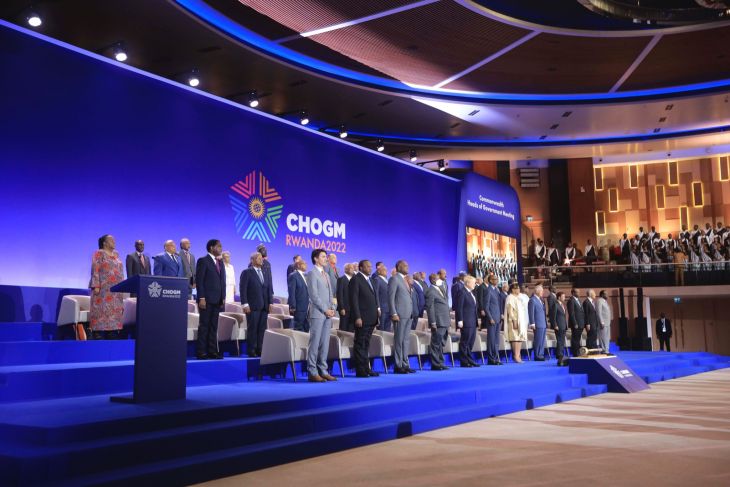What can one say about an organization that holds its biennial summit in which four key of the key leaders don’t attend?
In my view, it sends a serious message that some key countries do not view their membership in the organization as a foreign policy priority.
The Commonwealth defines itself as an association of 56 independent countries, home to 2.5 billion people from every region of the world. It includes both advanced economies and developing countries. Its members have committed to democracy and respect for human rights. While its roots go back to the British Empire, today any country can join. The last country to join the Commonwealth was Rwanda in 2009.
From June 23-25, the Commonwealth held its biennial Heads of Government Meeting (CHOGM by its acronym) in which all fifty-six heads of state or government were expected to participate. However, India’s Prime Minister Modi, Australia’s Prime Minister Albanese, New Zealand’s Prime Minister Ardern, and South Africa’s Ramaphosa – four major players in the Commonwealth - decided not to attend. Ramaphosa and Modi chose to attend the annual BRICS Summit (Brazil, Russia, India, China, South Africa) hosted by China, thereby appearing to give the Russian leader Putin an opportunity to shine once more on the international stage.
But is the absence of key members this year an indication that the organization may not be perceived as being fit for purpose any longer?
The Commonwealth does many things well.
It provides small island states with backing in major international arenas on existential issues such as climate change. It provides many small states with a voice at the United Nations in Geneva and New York through the good offices of the Secretary General of the Commonwealth since some cannot afford to house permanent missions to these cities. It provides training and assistance on global trade issues to many small states that don’t have the staff or resources to manage these on their own.
Yet, during the four and a half years I spent as Spokesperson for the Secretary General, I was never able to explain why many of its members retain authoritarian governments or are absolute monarchies (Eswatini and Brunei) despite the commitment by all members to pursue democratic governance and respect human rights and freedom of speech.
And herein lies its major failing.
This year’s host was Rwandan President Paul Kagame, an autocrat who persecutes and jails his opposition, stifles free media, and has ruled with an iron hand since coming to power in 2000, after serving as Vice President and military strongman since 1994. He has involved himself in guerrilla warfare in the Democratic Republic of the Congo and does not appear to believe in or follow the Commonwealth’s aspirational goals of respect for democracy or human rights.
India is pursuing its own national interests. Prime Minister Modi is looking for cheap Russian energy and weapons, and Western sanctioned Russia is seen as an excellent market for Indian products and technology. His government, while democratically elected, is increasingly becoming authoritarian, and he has a close relationship with and affinity for Russia’s Putin. His anti-Muslim rhetoric is providing Hindu nationalists with the legitimacy they crave to oppress the large Muslim minority – against Commonwealth principles.
South Africa has very good relations with China. Since 2009, China has become South Africa's biggest trade partner and export destination while South Africa has become China's largest trading partner in Africa. Bilateral trade has hit a record high of more than 45 billion U.S. dollars annually, accounting for a quarter of China’s trade with Africa. The relationship continues to grow as China implements its Belt and Road initiative in that country.
One can conclude that in this increasingly polarized world where the economic and military centers of power are shifting, both Ramaphosa and Modi have opted for pursuing a foreign policy based on realpolitik rather than one based on aspirational goals. That is their right and is the only realistic path that they can take in order to sustain economic growth and social peace.
The other two major leaders who did not attend have more geopolitical and security concerns. Prime Ministers Ardern and Albanese are far more concerned with the threat posed by China in their region and saw more sense in attending the NATO Summit in Madrid rather than the Commonwealth gathering.
From a realpolitik point of view, this also makes sense.
Finally, the Commonwealth appears to be deeply divided over the question of Ukraine. The final communique “took note” of the situation in Ukraine, but a majority of members refused to include any criticism of Russia in the final document.
As developing economies, they seek access to the low cost Russian energy, sophisticated weapons systems that Russia has no qualms in providing, and access to the Russian market now that Western exporters are frozen out due to sanctions.
It was left to the Canadian and British Prime Ministers to raise the issue forcefully with the media outside of the meeting.
All in all, not a show of geopolitical strength on the part of the organization’s membership and yet another sign of the diminishing credibility of the Commonwealth and of other multilateral institutions in a rapidly changing world.
Keep reading: Playing the Long Game
Edición: Laura Espejo
Habrá extensión de los horarios de servicio de transporte
La Jornada
El valor comercial estimado de las especies supera los 420 mil pesos
La Jornada
Mercurio, Venus, Júpiter y Saturno serán visibles a simple vista si el cielo está despejado
The Independent
Olvera, Agúndez, Vázquez y Willars alcanzaron la presea en la final de equipo mixto de 3 y 10 metros
La Jornada
